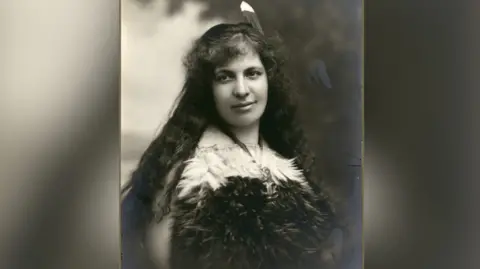Posthumous degree for first indigenous woman
 Pitt Rivers Museum, University of Oxford
Pitt Rivers Museum, University of OxfordA university has awarded a posthumous degree to its first indigenous female student more than 100 years after she began her studies.
Born in New Zealand in 1873, Mākereti Papakura is believed to be the first indigenous woman to enrol at the University of Oxford.
The university said she had explored the customs of her people of the Māori Te Arawa iwi [tribe] from a female perspective through her "groundbreaking" research. But she died in 1930, just weeks before she was due to present her thesis.
Prof Irene Tracey, Vice Chancellor of the University of Oxford, will award the degree of MPhil in Anthropology at a ceremony in the Sheldonian theatre later in the year.
 Alamy
AlamyMs Papakura was born Margaret Pattison Thom at Matatā in the Bay of Plenty to an English father, William Thom, and a Māori mother, Pia Ngarotū Te Rihi.
She enrolled in 1922 to read anthropology at Pitt Rivers Museum, where much of the teaching was conducted at the time, and at the Society of Home Students, now St Anne's College.
The university said her scholarship, combined with her indigenous worldview, "earned her the respect of many Oxford academics at the time".
It added that it had gone on "to be celebrated by members of Māori communities and researchers worldwide".
After her sudden death, her family agreed that her good friend Thomas Kenneth Penniman, a Rhodes Scholar and fellow Oxford anthropologist, published her work.
The book titled The Old-Time Māori became the first study of Māori life published by a Māori author and is recognised as such by the New Zealand Royal Society.
'An inspiring figure'
The posthumous award was requested by the School of Anthropology and Museum Ethnography, which applied to the university's education committee.
The application was supported by St Anne's College and the Pitt Rivers Museum, to which Ms Papakura and her family donated numerous artefacts and papers both during her lifetime and after her death.
Prof Clare Harris, head of the School of Anthropology and Museum Ethnography, called Ms Papakura "an inspiring figure, not only to many in Aotearoa [which has been used when referring to New Zealand in Māori] but to students and scholars around the world".
Members of her family and representatives of the Māori community are expected to attend the award ceremony.
June Northcroft Grant, on behalf of Ms Papakura's family and Tūhourangi – Ngāti Wāhiao iwi, said her story was "a testament to the lasting power of education, culture, and the determination of one woman to ensure that Māori stories would not be forgotten.
"This recognition belongs to Mākereti, to our ancestors, and to the Māori community worldwide".
You can follow BBC Oxfordshire on Facebook, X (Twitter), or Instagram.
